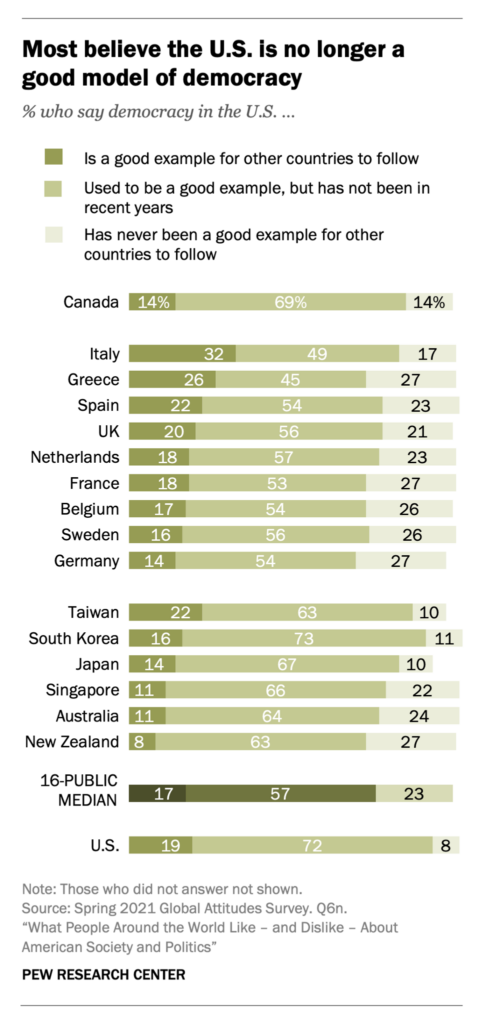
Opinions of American democracy have declined overseas even as other forms of US power remain in high regard, according to a new survey from the Pew Research Centre.
“A median of just 17% say democracy in the U.S. is a good example for others to follow, while 57% think it used to be a good example but has not been in recent years,” it states. “Another 23% do not believe it has ever been a good example.”
72% of Americans share the view that their democracy is no longer a model, adds the report, drawn from Pew’s global attitudes survey, which surveyed more than 16,000 adults from 16 advanced economies between March and May, and 2,500 US adults during early February.
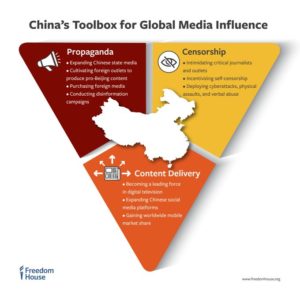 China’s image around the world has also declined over recent years, said Laura Silver, an author of the report.
China’s image around the world has also declined over recent years, said Laura Silver, an author of the report.
“In almost no public survey did more than a third of people say that China respects the personal freedoms of its people, and in most places it was closer to around 10 per cent or so,” she said. “And so while we see that the US – in general, views of whether or not the US respects the personal freedoms of its people have fluctuated, by wide margins, in every single public survey, more people think that the US does this than China.”
While US President Joe Biden has vowed a major push to promote democracy worldwide, since he took office, democracy has faced repeated setbacks, AFP reports, citing democratic reversals in Myanmar, Sudan and Tunisia, and military coups in Guinea, Mali and Chad.
While local factors are at play in each country, experts see common trends including economic insecurities exacerbated by Covid-19 and climate change, ruling elites who failed to meet aspirations and the growing role of China, which can support nations shunned by the West, AFP adds.
“There is an increase in attacks on democracy around the world — and not in the demand for democracy,” said Derek Mitchell, the first US ambassador to Myanmar after its transition a decade ago. “It’s a matter of old mindsets dying hard, particularly in militaries where people don’t give up power and privilege easily,” added Mitchell, president of the National Democratic Institute.
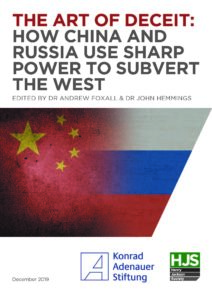 Russia and China are conducting a propaganda campaign against the forthcoming Summit for Democracy.
Russia and China are conducting a propaganda campaign against the forthcoming Summit for Democracy.
Russian Foreign Minister Sergei Lavrov said today that the United States is trying to inflate the number of participants. By hosting the summit, Washington aims to divide countries into “democracies” and “non-democracies,” and then “full” and “conditional” democracies, Lavrov said in an interview with the Russia 24 TV channel. This is because Americans want to have as many “extras” as possible like in a movie to create a vision that the United States-headed movement for democracy is popular, he said.
“Since the end of the Cold War, the political chaos of Western-style democracy has become the origin of the world’s political disorder,” claims a commentary in the regime’s Global Times, which tries to associate democratic governance with “social divisions, democratic deficits, governance failures, political dysfunction, political confrontation and so on.”
The summit is an attempt to “use ideology and values as tools to oppress other countries and advance geopolitical strategy,” according to Chinese Foreign Ministry Spokesperson Wang Wenbin.

National Endowment for Democracy (NED)
Democracy is not a slogan or a dogma, and should not be used as a pretext for imposing hegemony, he said in response to Lavrov’s recent comment that the Summit is “quite in the spirit of a Cold War, as it declares a new ideological crusade against all dissenters.”
Scott Warren, a visiting fellow at Johns Hopkins University’s Agora Institute, said that the forthcoming Summit should prioritize civil society and youth over government leaders.
“Sometimes the US strategy toward democracies can be very reactive. I think having a more proactive strategy — what conditions are going to be necessary in the long-term — is really important,” he told AFP.
Beijing’s ideological campaign is the latest manifestation of a sharp power offensive designed to undermine democratic norms and institutions.
When the Hamburg-based Carlsen Verlag took a children’s book from the market in March that claimed that the SARS-CoV-2 coronavirus came from China, it showed how the integrity of the publishing industry is threatened in an open society, note Christopher Walker and Jessica Ludwig, Vice President for Studies and Analysis at the National Endowment for Democracy, and Senior Program Officer at the NED’s International Forum for Democratic Studies, respectively. The Chinese consulate in Hamburg had threatened criminal prosecution and demanded a public apology over the book, “A Corona Rainbow for Anna and Moritz”, which aimed to help smaller children understand the changes the pandemic brought about in their lives. The publisher withdrew the book and replaced it with a new edition in which the objectionable passage reappeared in a different form.
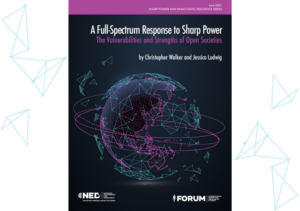 The episode would be less worrying if it was an isolated incident. The problem, however, is that this encroachment by an external autocratic power reflects a global pattern. The aim of interventions of this kind is to question and increasingly undermine the standards of freedom of expression, they write for the Frankfurter Allgemeine Zeitung.
The episode would be less worrying if it was an isolated incident. The problem, however, is that this encroachment by an external autocratic power reflects a global pattern. The aim of interventions of this kind is to question and increasingly undermine the standards of freedom of expression, they write for the Frankfurter Allgemeine Zeitung.
As noted in our 2017 report Sharp Power: Rising Authoritarian Influence, the success of the leading authoritarian regimes can in large part be attributed to the exploitation of a blatant asymmetry, they add: “At a time of intense globalization, the regimes in Russia and China are establishing barriers against external political and cultural influences in their own country at the same time as they abuse the openness of democratic systems abroad.”
The success of authoritarian narratives is evident in a new report which finds that the majority of Serbian citizens believe Russia and China have had a positive influence while the US, European Union and NATO to have been negative, Euractiv reports. Even in areas like donations and assistance to Serbia, where the EU, followed by the US, lead the field, citizens believe aid from Russia and China was greater, according to public opinion research from the Belgrade-based Center for Free Elections and Democracy (CESID) and the International Republican Institute (IRI).
Unless the U.S. stands for democratic values and seeks to empower people to achieve democratic results, we weaken ourselves fundamentally, argues Douglas E. Schoen, the author of, “The End of Democracy? Russia and China on the Rise and America in Retreat.”
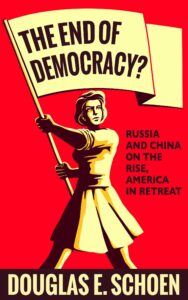 The Checklist to End Tyranny in the book, Is Authoritarianism Staging A Comeback?, provides specific steps that dissidents and activists might take to produce democratic change and defeat totalitarian leaders through non-violent civil resistance, he writes for the Hill.
The Checklist to End Tyranny in the book, Is Authoritarianism Staging A Comeback?, provides specific steps that dissidents and activists might take to produce democratic change and defeat totalitarian leaders through non-violent civil resistance, he writes for the Hill.
With the possible exception of Afghanistan, where Biden’s decision to end the two-decade US war has been hotly debated, few link democracy’s woes to the current occupant of the White House, AFP adds.
“Democracy takes literally decades to consolidate and it takes years to erode. So I think there’s very little that any administration could do in the first nine months tangibly moving the needle on global democracy,” said Carnegie analyst Frances Z. Brown, who worked on supporting democracies in Barack Obama’s White House.
What can democratic societies do to keep their standards high and resist censored attacks by authoritarian powers who are making ever more costly efforts to override basic democratic rules? the NED’s Walker and Ludwig ask:
- A significant part of the problem is related to the fact that democratic states are not adequately prepared. Many institutions are insufficiently aware of the nature of the relationships they have with partners from authoritarian systems….
- Second, civil society – in the broadest sense – has a major competitive advantage of democracies over authoritarian states. In this new environment, non-governmental actors – for example (but not limited to) the media, universities, publishers and entertainment media – need to develop strategies that strengthen society’s resilience and standards of openness, accountability and institutional integrity….
- Third, we must cultivate unity among democracies to confront autocratic cooperation and mutual learning. The heads of critical institutions in democracies – publishers, media officers, university administrations – should coordinate their efforts instead of trying to cope with the pressure of authoritarian regimes alone.
- Finally, democracies of all kinds must have a common interest in defending their values and norms. … Interdisciplinary cooperation spanning as many areas as possible should decide whether it is possible to accelerate and deepen the learning processes in and between democracies. RTWT
The economic blow from Covid-19 and China’s global influence have hastened the democratic decay, said Jonathan Powell, an expert in civil-military relations at the University of Central Florida.
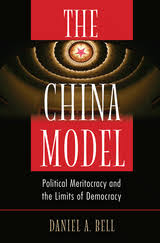 “When you have countries that are already dealing with a very delicate balance between authoritarianism and attempting to maintain some form of democratic stability, when you have some sort of a shock to the system, even if it doesn’t necessarily seem as bad as what some other countries are dealing with, it can really have a critical impact,” he told AFP.
“When you have countries that are already dealing with a very delicate balance between authoritarianism and attempting to maintain some form of democratic stability, when you have some sort of a shock to the system, even if it doesn’t necessarily seem as bad as what some other countries are dealing with, it can really have a critical impact,” he told AFP.
As for the alternative ‘China Model‘……
“It’s not on the scale that we would have had during the Cold War with the Soviet Union,” Powell said. “But it is a similar dynamic where if you do have one side cut off military or economic assistance, there is a foregone conclusion that you can go to the other side.”







